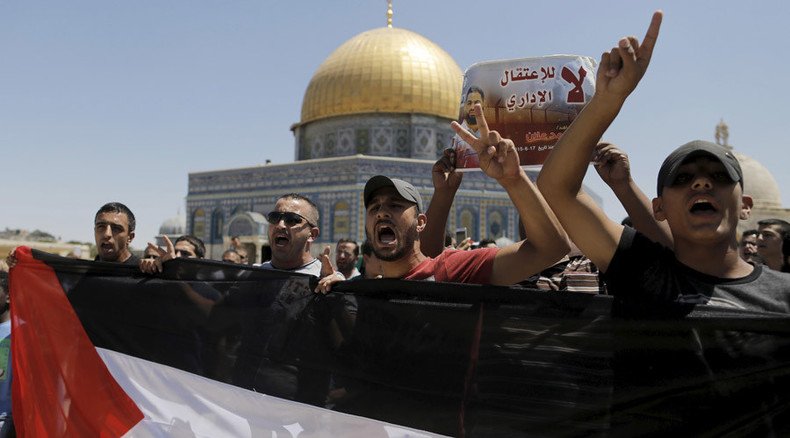UN condemns Israel force-feeding prisoners, indefinite detention, 20yr sentences for stone-throwers

The UN has criticized Israel's decision to imprison stone-throwers for up to 20 years, as well as its force-feeding of prisoners on hunger strike. The organization said the moves threaten to worsen an “already precarious human rights situation.”
Israel approved the right to force-feed prisoners on hunger strike last month. The measure prompted condemnation from rights groups and the country's own Medical Association, which considers force-feeding a form of torture and medically risky. It has urged Israeli doctors not to abide by the law.
Feltman 2 #UNSC: Recent changes in Israeli law&policy affecting OPT including E. Jerusalem risk compounding already-precarious HR situation.
— UN Political Affairs (@UN_DPA) August 20, 2015Speaking to the UN Security Council on Wednesday, UN political affairs chief Jeffrey Feltman tackled the situation of hunger-striking prisoners, stressing that “careful consideration should be placed on addressing the underlying human rights concerns, which lead prisoners to such extreme protests,” such as hunger strikes.
Feltman specifically noted that one of the major reasons that prisoners go on hunger strike is administrative detention – the act of holding someone indefinitely without charge or trial. The practice is commonly used with Palestinian militant suspects, though it was recently extended to Israel's own citizens.
On August 2, Tel Aviv approved a law that will allow Jewish terror suspects to be detained without trial.
“There is no choice but to treat suspects of hate crimes against Palestinians the same way as Palestinian suspects of terror,” a senior security official told Israeli Radio at the time.
It came as Prime Minister Benjamin Netanyahu was forced to respond to separate attacks, which led to the deaths of a Palestinian toddler and an Israeli teenager.
Expressing concern over Israel's extension of administrative detention, Feltman called for all detainees to be promptly charged or released.
Palestinian hunger striker Mohammed Allan held by #Israel w/o charge slips into coma http://t.co/EUZwxQnBHGpic.twitter.com/AiyweittQI
— RT (@RT_com) August 14, 2015One of the detainees is Mohammed Allan, who launched a 65-day hunger strike to protest against his detention without trial. His case has sparked international condemnation and prompted protests in both Israel and the West Bank, including a mock force-feeding in Gaza City.
The Israeli government has temporarily ended Allan's administrative detention, but has ordered him to remain in hospital pending a final decision on his case. The 31-year-old is once again in a medically induced coma, and has suffered brain damage. It is unclear whether the damage, likely suffered due to a vitamin deficiency caused by the hunger strike, is permanent.
Addressing yet another controversial move made by Israel in recent weeks, Feltman spoke about Tel Aviv's decision to imprison people caught throwing stones at cars or roads for up to 20 years, saying it was “likely to affect children disproportionately.”
Also on Wednesday, Feltman criticized “the environment created as a result of Israel's decades-long policy of illegal settlement activities,” saying it has led to extreme violence in the area, including the recent torching of a Palestinian home amid a rise of ultra-nationalist attacks, which the Israeli government has so far failed to curb.
Feltman to #UNSC: "reiterate #UNSG’s strong condemnation of horrific terrorist arson attack against Palestinian family in occupied Duma"
— UN Political Affairs (@UN_DPA) August 20, 2015He ended by noting the “risk of escalation in Israel and Palestine is palpable,” saying “the past month has witnessed unconscionable crimes of hatred by extremist elements, reprehensible retaliatory violence, provocations at Jerusalem's holy sites, and a worrying increase in rockets launched from Gaza towards Israel.”
The latest round of US-sponsored peace talks between Israel and the Palestinians broke down in 2014, and violence has simmered in the region since then. One year ago, Operation Protective Edge in Gaza killed more than 2,100 Palestinians, mostly civilians. Sixty-seven Israeli soldiers and six civilians were also killed.












